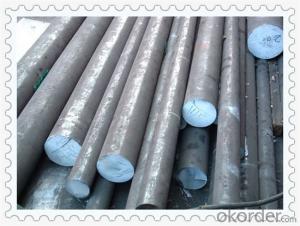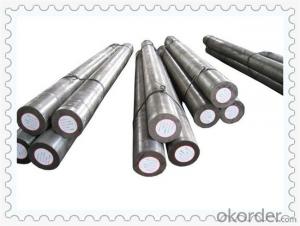30CrMo Alloy Steel Round Bars AISI 4130
- Loading Port:
- China main port
- Payment Terms:
- TT OR LC
- Min Order Qty:
- 30 m.t.
- Supply Capability:
- 10000 m.t./month
OKorder Service Pledge
OKorder Financial Service
You Might Also Like
30CrMo Alloy Steel Round Bars AISI 4130
Products Details
1. AISI 4130 alloy round bar, hot sales !!!
2. Customized size
3. Manufacturer
100% China Manufacturer aisi 4130 alloy round bar
INTRODUCTION
ITEM | aisi 4130 alloy round bar |
BRAND | TZHD |
MATERIAL | 200 SERIES & 300 SERIES & 400 SERIES |
STANDARD | GB, AISI, ASTM, ASME, EN, BS, DIN, JIS |
CERTIFICATE | BV,SGS,ISO |
SURFACE | ordinary industrial surface, or customized |
THICKNESS | customized |
WIDTH | customized |
LENGTH | 2000-6000mm, or customized |
APPLICATION | Construction and decoration, as well as all kinds of industries and manufacture |
PACKING | Regular packing or as required |
SHIPMENT | As required |
LEAD TIME | 3-20 days after deposit |
PAYMENT | T/T, L/C |
| Grade | 201 | 202 |
| 301(1Cr17Ni7) | ||
| 302(1Cr18Ni9) | 302HQ | |
| 303(YICr18Ni9) | 303Cu | |
| 304(0Cr18Ni9) | 304Cu, 304HC | |
| 304L(00Cr19Ni9) | ||
| 310(1Cr25Ni20) | ||
| 321(1Cr18Ni9Ti) | ||
| 316(0Cr17Ni12Mo2) | ||
| 316L(00Cr17Ni12Mo2) | ||
| 410(1Cr13) | ||
| 416(Y1Cr17) | ||
| 420(2Cr13) | 420F | |
| 430(1Cr17) |
Products Show
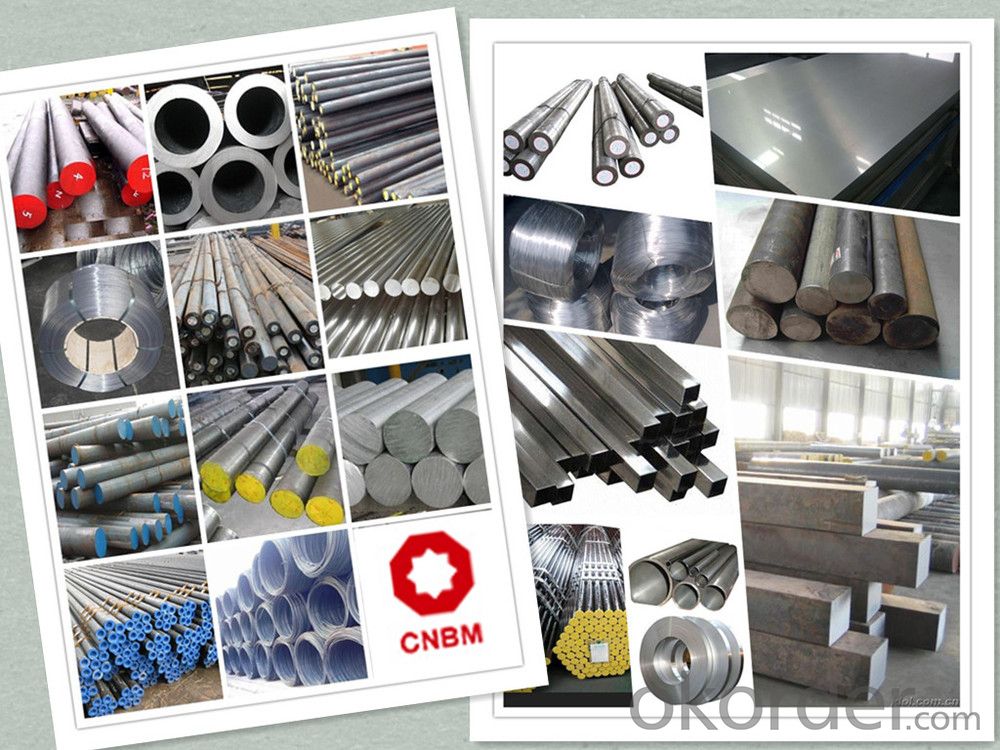
Product Overviews
| Product Name | Typical Grades | Diameter(mm) | Standard adopted |
| Carbon Steel | 20 (1020/S20C/C22) | Ø16-Ø300 |
GB/SAE/JIS/DIN
|
| 40 (1040/S40C/C40) | |||
| 45 (1045/S45C/C45) | |||
| Bearing Steel | GCr9 (51100/SUJ1) | Ø12-Ø250 | |
| GCr15 (52100/SUJ2/100Gr6) | |||
| GCr9SiMn (A485-Gr.1/SUJ3) | |||
Cr-Mo Steel | 20Cr (5120/SCr420H/20Cr4) | Ø12-Ø250 | |
| 40Cr (5140/SCr440/41Cr4) | |||
| 42CrMo(4140/SCM440/42CrMo4) | |||
| Gear Steel | 20CrNiMo | Ø16-Ø600 | |
| 20CrMn(5115/SMnC420/20MnCr5) | |||
| 20CrNiMo(8620/SNCM220/20CrMiMo2) |
Application
| Carbon Steel | Mold bottom, Plastic mold, Construction machinery parts Automobile parts, Security grills, Screens, Construction |
| Bearing Steel | Aerospace, Navigation, Nuclear energy, Chemical industry Electronic information, Petrochemical, Instrument and meter Transportation |
| Cr-Mo Steel | Mechanism & Fasteners gear, Stressed components for vehicles Engines and machines, Parts of larger cross-section |
| Gear Steel | All kinds of gears, Statically and dynamically stressed component for vehicles Engines and machine, Larger cross-section parts, Crankshafts |
Work Shop
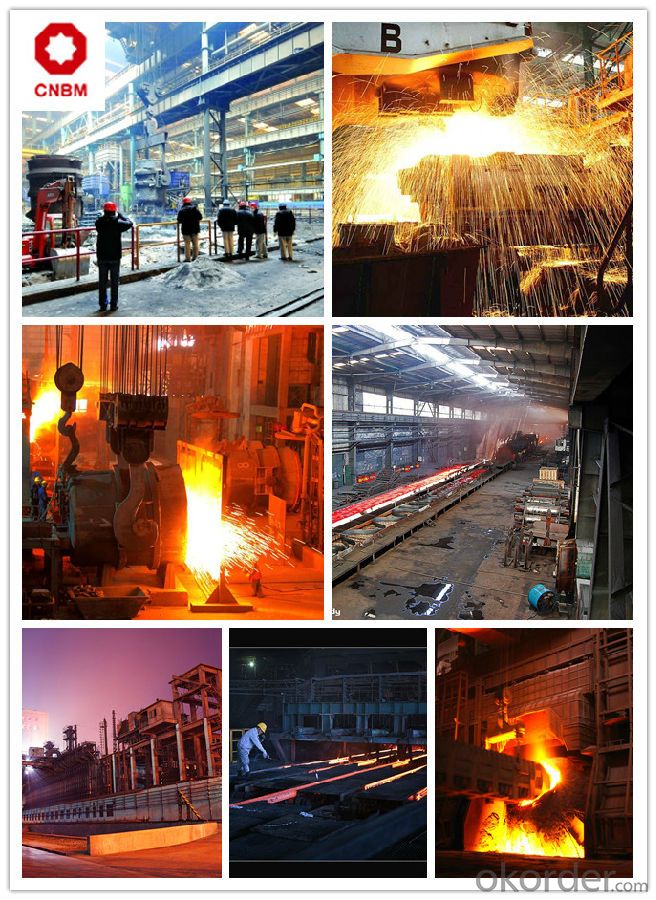
Company Information
CNBM International Corporation is the most important trading platform of CNBM group.
Whith its advantages, CNBM International are mainly concentrate on Cement, Glass, Iron and Steel, Ceramics industries and devotes herself for supplying high qulity series of refractories as well as technical consultancies and logistics solutions.

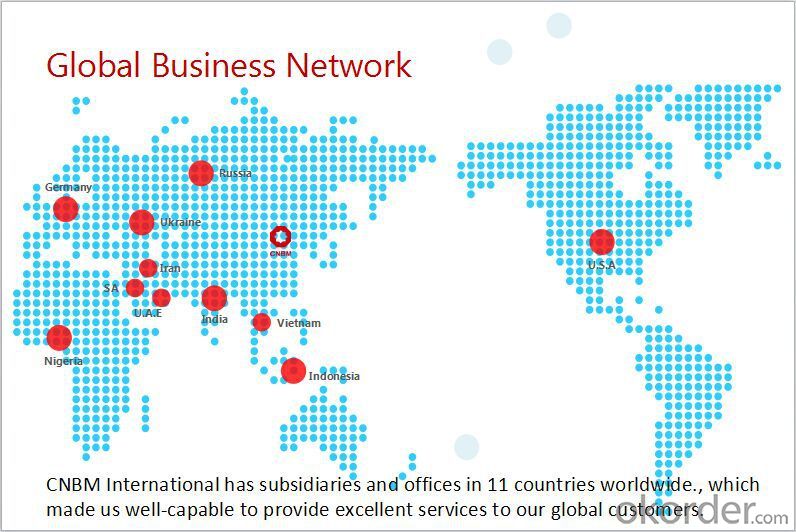
FAQ
1, Your advantages?
professional products inquiry, products knowledge train (for agents), smooth goods delivery, excellent customer solution proposale
2, Test & Certificate?
SGS test is available, customer inspection before shipping is welcome, third party inspection is no problem
3, Factory or Trading Company?
CNBM is a trading company but we have so many protocol factories and CNBM works as a trading department of these factories. Also CNBM is the holding company of many factories.
4, Payment Terms?
30% TT as deposit and 70% before delivery.
Irrevocable L/C at sight.
5, Trading Terms?
EXW, FOB, CIF, FFR, CNF
6, After-sale Service?
CNBM provides the services and support you need for every step of our cooperation. We're the business partner you can trust.
For any problem, please kindly contact us at any your convenient time.
We'll reply you in our first priority within 24 hours.
Packaging & Delivery
1, Packaging: seaworthy package or as required
2, Delivery: 35-45 days or based on quantity
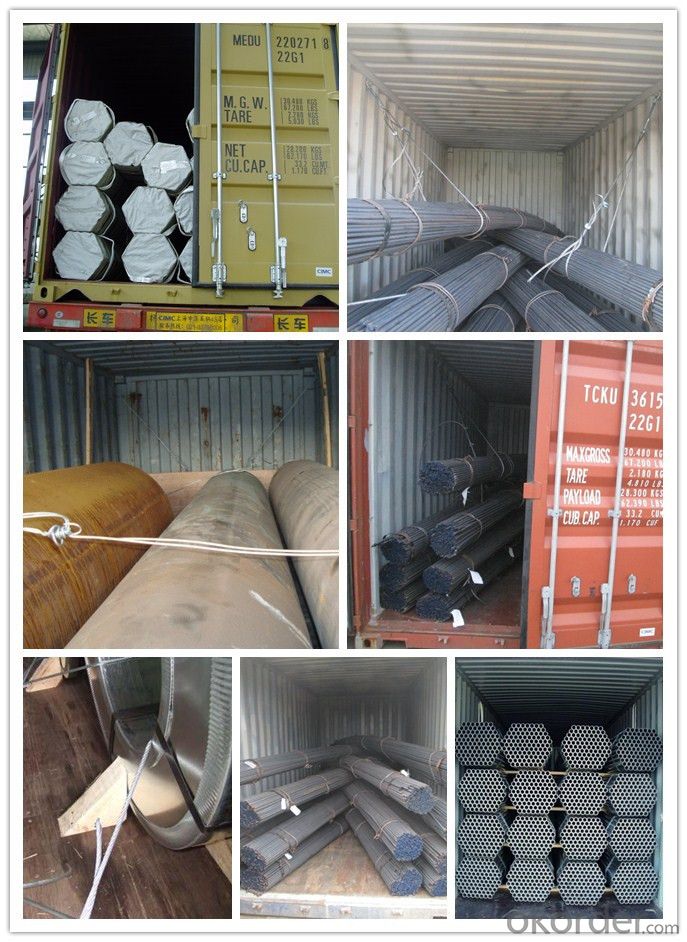
- Q:What is the difference between a peeled and a centerless ground steel round bar?
- A peeled steel round bar involves the removal of the outer surface to achieve a smooth and precise finish. This is typically done using a peeling machine. The purpose of this process is to eliminate any imperfections or scale on the bar's surface, resulting in a polished appearance. Additionally, the peeled round bar goes through a sizing process to ensure accurate dimensions. This makes it suitable for various applications where a smooth surface and precise dimensions are important. In contrast, a centerless ground steel round bar is achieved through the use of a centerless grinding machine. This process entails feeding the bar through grinding wheels that rotate at different speeds. Material is removed from the outer diameter of the bar to attain the desired size and surface finish. Centerless grinding offers tight tolerances and precise sizing, making it suitable for applications that demand high precision and accuracy. In summary, the primary distinction between a peeled and a centerless ground steel round bar lies in the method employed to achieve the desired surface finish and dimensional accuracy. While both processes result in a smooth and precise bar, peeling eliminates material from the outer surface, whereas centerless grinding removes material from the outer diameter. The choice between the two depends on the specific requirements of the application, as well as the desired surface finish and dimensional accuracy.
- Q:Can steel round bars be used for shafts or axles?
- Yes, steel round bars can be used for shafts or axles. Steel round bars are commonly used in various industries, including automotive, machinery, and construction, for their strength, durability, and versatility. They are often chosen for shafts or axles due to their ability to withstand heavy loads, provide reliable support, and resist wear and tear. Steel round bars can be machined and heat-treated to meet specific requirements, making them suitable for use as shafts or axles in various applications where strength and reliability are crucial, such as in vehicles, industrial equipment, and rotating machinery.
- Q:What are the safety precautions to be taken while handling steel round bars?
- To prevent accidents and injuries when working with steel round bars, it is crucial to adhere to specific safety measures. Here are several precautions that should be taken: 1. Personal Protective Equipment (PPE) is essential. Wear suitable gear, such as safety goggles, gloves, and steel-toe boots, to safeguard against potential hazards like flying debris, sharp edges, and crushing injuries. 2. Employ proper lifting techniques. Bend your knees and use your leg muscles instead of your back to avoid strain or back injuries. Do not attempt to lift heavy steel round bars alone; seek assistance or utilize lifting equipment like cranes or forklifts. 3. Ensure secure storage. Store steel round bars in a stable and secure designated area or rack. Organize and stack them correctly to prevent falling or rolling onto individuals. 4. Utilize appropriate handling tools. Use tools like tongs or lifting hooks to handle steel round bars. Refrain from using your hands or fingers directly to avoid cuts or pinching injuries. 5. Conduct inspections. Before handling steel round bars, inspect them for defects, sharp edges, or protrusions that may pose safety risks. Report any issues to the appropriate personnel and do not use the bars until they are repaired or replaced. 6. Maintain clear communication with co-workers. Especially in situations involving multiple individuals, employ hand signals or verbal cues to coordinate movements and avoid accidental collisions. 7. Ensure proper storage and transportation. When storing or transporting steel round bars, secure them adequately and provide sufficient support to prevent shifting, sliding, or falling during movement. 8. Provide comprehensive training. Train all personnel involved in handling steel round bars, covering proper lifting techniques, the use of PPE, and awareness of potential hazards and safety procedures. By adhering to these safety precautions, the risk of accidents and injuries while working with steel round bars can be minimized. Always prioritize safety to create a secure working environment for yourself and those around you.
- Q:Why is the round bar bent?
- In fact, the stress and deformation complex around reinforced concrete, bond stress varies with grip length of the rebar so bond strength with steel type, shape and position of the embedded in concrete, different direction and change, is also related to concrete strength, concrete compressive strength the higher the strength, the bond strength is generally determined by R=P/3.14dL. P for pullout force, D, rebar diameter, L, steel embedment length.
- Q:Can steel round bars be used in the production of electrical equipment?
- Steel round bars are capable of being utilized in the production of electrical equipment. Steel possesses a multitude of properties that render it suitable for various applications, including electrical equipment. Components such as shafts, connectors, and structural supports within electrical equipment can be manufactured using steel round bars. The reliability of steel is derived from its strength and durability, enabling it to withstand the mechanical stresses and environmental conditions that electrical equipment may encounter. Moreover, steel offers favorable electrical conductivity and magnetic properties, crucial characteristics for specific electrical components. Nevertheless, it is important to acknowledge that steel round bars may necessitate additional processes like machining, heat treatment, or surface finishing in order to meet specific requirements for the production of electrical equipment.
- Q:What are the different types of steel round bars used in the automotive exhaust systems?
- Automotive exhaust systems utilize various types of steel round bars, each possessing distinct characteristics and uses. Let's explore some of the commonly employed varieties: 1. Stainless Steel Round Bars: Renowned for its exceptional resistance to corrosion and high temperatures, stainless steel stands as a favored option for exhaust systems. Its versatility allows for application in both primary and secondary components, including headers, catalytic converters, and mufflers. 2. Carbon Steel Round Bars: Carbon steel represents another frequently employed material in exhaust systems. Its commendable strength and durability render it suitable for various components, such as exhaust pipes and hangers. However, due to its susceptibility to corrosion in comparison to stainless steel, appropriate coating or treatment becomes imperative to prevent rusting. 3. Aluminized Steel Round Bars: Aluminized steel, a form of carbon steel coated with an aluminum-silicon alloy, boasts excellent corrosion resistance and heat reflectivity. These attributes make it an ideal choice for exhaust systems, particularly in exhaust pipes and mufflers, as it aids in heat reduction and enhances overall durability. 4. Titanium Round Bars: Although less commonly utilized due to its substantial cost, titanium serves as an extraordinarily lightweight and durable material, offering exceptional corrosion resistance. In high-performance or specialized exhaust systems, titanium round bars may be incorporated to reduce weight and improve overall performance. Its presence is often observed in exhaust tips and high-end aftermarket exhaust systems. In conclusion, the selection of steel round bars for automotive exhaust systems hinges on various factors, including cost, performance requirements, and specific application needs. Manufacturers meticulously choose the appropriate steel type to ensure longevity, efficiency, and compliance with emissions regulations.
- Q:Can steel round bars be used in the food processing industry?
- Yes, steel round bars can be used in the food processing industry. Steel is a common material used in various industries due to its strength, durability, and resistance to corrosion. In the food processing industry, steel round bars are often used for equipment such as food mixers, conveyors, and cutting tools. These bars are typically made from stainless steel, which is a specific type of steel that contains chromium and other elements to enhance its resistance to corrosion and staining. Stainless steel is non-reactive and does not impart any flavors or odors to the food being processed. Furthermore, it is easy to clean and maintain, making it suitable for use in food processing facilities where hygiene is of utmost importance. However, it is important to ensure that the steel round bars used in the food processing industry meet the necessary standards and regulations to ensure the safety of the food being processed.
- Q:What is the maximum nitrogen content allowed for steel round bars?
- The maximum nitrogen content allowed for steel round bars varies depending on the specific steel grade and application requirements. However, in general, the nitrogen content is typically limited to around 0.025-0.035% to maintain the desired mechanical properties and avoid detrimental effects on the material's performance.
- Q:What are the advantages of using nickel-tungsten alloy steel round bars?
- There are several advantages to using nickel-tungsten alloy steel round bars. Firstly, the inclusion of nickel enhances the corrosion resistance of the bars, making them suitable for use in harsh environments. Additionally, the addition of tungsten improves the strength and hardness of the bars, making them highly durable and able to withstand heavy loads and high temperatures. Furthermore, the alloy steel composition provides excellent wear resistance, making these bars ideal for applications that require prolonged use or frequent contact with abrasive materials. Overall, nickel-tungsten alloy steel round bars offer a combination of corrosion resistance, strength, and durability, making them a reliable choice for various industrial applications.
- Q:What are the different types of steel round bar alloys for improved corrosion resistance?
- There are several different types of steel round bar alloys that offer improved corrosion resistance. Some common examples include stainless steel alloys such as 304, 316, and 410, which contain chromium and nickel to create a protective layer against corrosion. Additionally, weathering steel alloys like ASTM A588 and A709 are known for their ability to develop a rust-like appearance that acts as a protective barrier. Other options include duplex stainless steels, which combine the benefits of austenitic and ferritic alloys, and high-alloy steels like Inconel and Hastelloy, which are highly resistant to corrosion in extreme environments.
1. Manufacturer Overview |
|
|---|---|
| Location | |
| Year Established | |
| Annual Output Value | |
| Main Markets | |
| Company Certifications | |
2. Manufacturer Certificates |
|
|---|---|
| a) Certification Name | |
| Range | |
| Reference | |
| Validity Period | |
3. Manufacturer Capability |
|
|---|---|
| a)Trade Capacity | |
| Nearest Port | |
| Export Percentage | |
| No.of Employees in Trade Department | |
| Language Spoken: | |
| b)Factory Information | |
| Factory Size: | |
| No. of Production Lines | |
| Contract Manufacturing | |
| Product Price Range | |
Send your message to us
30CrMo Alloy Steel Round Bars AISI 4130
- Loading Port:
- China main port
- Payment Terms:
- TT OR LC
- Min Order Qty:
- 30 m.t.
- Supply Capability:
- 10000 m.t./month
OKorder Service Pledge
OKorder Financial Service
Similar products
New products
Hot products
Related keywords
